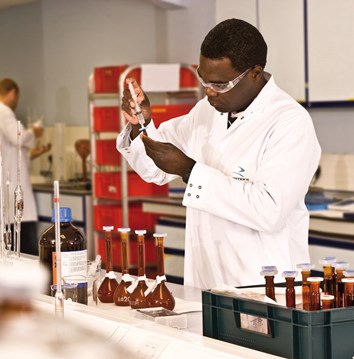All change: The transformation of a newly independent business
It’s been a time of great change for most businesses, with Rosemont Pharmaceuticals no exception. The firm has been embracing change since it spun out of its listed parent in June 2020 before embarking on an exciting journey of growth, resulting in sales and profits growing by over a third in the first year.
You really gain an appreciation for the capabilities you have when you suddenly lose some. The management at leading UK liquid pharmaceuticals business Rosemont Pharmaceuticals know this very well, having carved themselves out of their listed parent Perrigo, a large business with a focus on consumer healthcare products, in June 2020. The deal was orchestrated by Inflexion, which has provided capital and expertise to facilitate the complex carve-out.
The process is described by Rosemont CEO Howard Taylor as “very engaging, liberating and productive – but also very stressful.” The productive element is clear: sales grew by 49%, contracts agreed for development and in-licensing of 33 new products and the team was greatly enhanced.
The firm is eagerly looking to the US as a big and interesting market, with Rosemont applying a three- pronged approach to expansion there: internal capability, which involves a new set of labs in Leeds with 23 scientists creating products specifically for the US; creating a target list of companies and products for potential M&A; and working with an in-licensing partner in the UK who can also do work in the US. They are implementing different processes to speed up development, with a target from inception to launch of four years for new products, against a historical average of around seven years.
The labs in Leeds alone involve £5 million of expenditure, reflecting how seriously management and Inflexion take the endeavour.
People power
Underpinning all of Rosemont’s success to date and future plans are the people powering it. The organisation has grown 10% in the first year since the carve-out. “Inflexion were very, very helpful in connecting me with people to help source and then their internal talent director helped me select the best candidates,” says Howard, noting a talent void at the senior level once Rosemont stepped out of the management matrix at Perrigo.
Together they appointed a Chief Commercial Officer, CFO and Chief Scientific Officer before then setting out to build the rest of the team. Their plans for growth meant very specific skillsets were needed. “I was looking at recruitment from a corporate viewpoint and hadn’t anticipated the speed at which we’d pursue international expansion and M&A. It became clear we needed a CCO to really drive our growth opportunities, and that both private equity and pharma experience would be crucial for this role,” Howard recalls. They also appointed a CSO with a wealth of sector experience.
“The opportunity for Rosemont to grow its product range and geographic reach is huge,” says Ben Long, Healthcare Partner at Inflexion. “The firm is already diversifying to areas beyond liquid medicines, and their ambitions to grow in the US are well supported with the newly enhanced team.” Looking ahead, there will be a focus on this international expansion, with plans to get people on the ground in countries including the US. The resource in Leeds will help to develop the right products for that market. The leadership team is also keen to drive efficiencies through embracing technology (see box).
The journey has been a challenge, but the path ahead is bright as a newly independent and freshly invigorated team look to grow.
We now have a very broad and experienced team which makes us feel more capable. This puts us in good stead for now, the next few years, and even in our life post-Inflexion.
Tech matters
Though Howard admits the carve-out was very successful, the process of a carve-out and the accelerated growth already achieved have been as rewarding as they’ve been challenging.
Rosemont had its own manufacturing and research and development when it was within Perrigo, but was dependent on its parent for finance and IT, and transitioning these to a newly independent Rosemont would prove tricky and require a lot of manpower and know-how. “We had to sort payroll and SAP, create a finance department, change our mission, reset our values, and realign hierarchies. The final part of the jigsaw is switching over ERP systems. It’s been a long, hard slog,” Howard recalls.
It's a necessary evil of independence. “Integrated systems can be complex to extricate relevant data from, and after that it is often the case that entirely new systems need creating. Fortunately we have backed a number of carve-outs in the past and so have experience we can draw on in this area. It’s time-consuming and easy to get wrong, so care and expertise are key,” says Alex Mathers, Digital Director at Inflexion.
The team are also trying to enhance Rosemont’s technology, with much of this taking place during the carve-out to help Rosemont be more efficient in all departments. Rosemont CFO Tim Busby explains this involved three areas: implementing a new ERP system; replacing 63 other supporting applications (across the business including areas such as quality, HR, maintenance, health and safety, regulatory, R&D); and finally implementing its own IT infrastructure. This latter point includes setting up a new cloud environment for server hosting, building up a new network and also replacing all the hardware.
It’s clearly a long journey. “Inflexion’s experience is tremendously helpful as it provides guidance and ongoing support,” Tim recalls. “A big part of it was understanding absolutely what was required. Engaging Partners in Change on Inflexion’s referral/recommendation as well as recruiting a Head of IT to take us through the migration phase and ongoing growth have been invaluable,” Tim says. The firm also got connected to others in the Inflexion portfolio that had been on the journey.
The IT they’ve built in the last year has all been set up with their growth plans in mind. “We’ve gone cloud-first, as it makes the system scalable.” He explains that this method makes it easier to integrate new offices or businesses, provides ease of remote access and a higher degree of cyber security. It also provides a good foundation for them to enhance their digital capability, with Tim explaining they have implemented some AI solutions to report more quickly and effectively, and they are looking to further use AI-based applications and robotic process automation in order to further improve effectiveness across a number of functions.
“It’s the right time to look at these things, because we’re growing. It’s a real opportunity to do it now,” Tim concludes.


